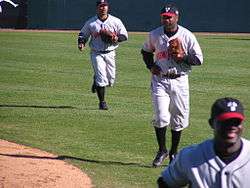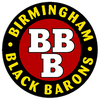Birmingham Black Barons
The Birmingham Black Barons played professional baseball in Birmingham, Alabama in the Negro Leagues from 1920 to 1960. They alternated home stands with the Birmingham Barons in Birmingham's Rickwood Field, usually drawing larger crowds and equal press.
| Birmingham Black Barons 1920–1960 Birmingham, Alabama | |||||
| |||||
| League affiliation(s) | |||||
|---|---|---|---|---|---|
| |||||
| Ballpark(s) | |||||
| Titles | |||||
| League titles | 1943 • 1944 • 1948 | ||||
Founding
Drawing largely from a successful American Cast Iron Pipe Company Industrial League team, the Black Barons were organized in 1920 for the inaugural season of Rube Foster's Negro Southern League, which operated mainly as a minor league. They played in that league for three years before making the leap to the larger Negro National League, which operated as a major league. They were unable to keep their position due to irregularities with the team finances and returned to the Southern League for three more years. Their return to the National League in 1927 was marked by the emergence of star pitcher Satchel Paige, who led the Black Barons to the second half pennant. They lost the Negro National League title to the Chicago American Giants in four straight games.
Later years
For the next decade or so they alternated leagues before being bought by Memphis, Tennessee, funeral home director Tom Hayes and joined the Negro American League in 1940. Early in the decade the team was sold again to Abraham Saperstein who also owned the Harlem Globetrotters basketball team. In 1943 and 1944 they won back-to-back pennants. Starting in 1945, they became full members of the Negro American League and continued their success, winning a third pennant in 1948 with the help of teenage outfielder Willie Mays. They ended up losing three Negro World Series to the Homestead Grays that decade, forging a notable rivalry. As the Major Leagues started signing talented African American players, the Black Barons tried to form a new Negro Southern League with three other Southern teams.
The franchise was owned by William Bridgeforth from 1952 to 1955, and by Sid Lynor and Floyd Meshac in 1955. Dr. Anderson Ross purchased the franchise in 1956 and renamed the team the Birmingham Giants.[1]
The Black Barons played their last game in 1960.
Throwback games

The 1999 Rickwood Classic honored the Black Barons, with the Birmingham Barons and Huntsville Stars wearing throwback uniforms. Some 35 former Negro Leagues players, including former Black Baron Charley Pride attended.
On February 26, 2006, ESPN Classic broadcast a throwback game from Rickwood Field featuring amateur players in the uniforms of the Birmingham Black Barons and fictitious "Bristol Barnstormers". The style of play, the equipment and the umpires all reflected the 1940s game. Willie Mays and Charley Pride were both in attendance. The Black Barons rallied to break an eighth inning tie and win the game, 9–8.
Notable players
In addition to Satchel Paige, Willie Mays also played as center fielder during both the 1948 and 1949 seasons. Mule Suttles was a member of the Black Barons in 1924 and 1925 seasons. Suttles was elected to the Baseball Hall of Fame in 2006. Other players, like Artie Wilson, Bill Greason, and Jay Heard also saw limited time (under 20 games each) in the Major Leagues.
Hall of Fame players
| Birmingham Black Barons Hall of Famers | |||
|---|---|---|---|
| Inductee | Position | Tenure | Inducted |
| Willie Mays | CF | 1948–1949 | 1979 |
| Satchel Paige | P | 1927–1930 | 1971 |
| Mule Suttles | 1B | 1924–1925 | 2006 |
| Willie Wells | SS | 1941 | 1997 |
Other star players
- Dan Bankhead (1940–1942, 1944)
- Sam Bankhead (1931–1932)
- Lyman Bostock Sr. (1940–1942, 1946)
- Bill Greason (1948–1949)
- Jay Heard (1946–1948)
- Jimmy Newberry (1944–1950)
- Charley Pride (1953)
- Artie Wilson (1944–1948)
Notes
- "Black Barons get a new name - Giants". Baltimore Afro-American. 1956-03-27. p. 17.
References
- Fullerton, Christopher D. (1999). Every Other Sunday: The Story of the Birmingham Black Barons. Birmingham: R. Boozer Press. ISBN 0-9636128-2-4.
- Birmingham Black Barons at the Birmingham-Pittsburgh Traveler page - accessed April 3, 2006
- "Still in the Game" (April 2006) Southern Living.
- Jordan, Phillip (February 23, 2006). "Nine Innings in Rickwood". Birmingham Weekly.
- Daily Defender. Chicago, Ill.: 1962.
External links
- BirminghamProSports.com
- ESPN Classic Vintage Live Negro League Baseball press kit with team rosters.
- 1920 Birmingham Black Barons Calendar

